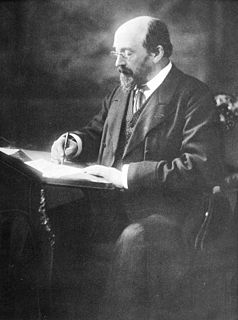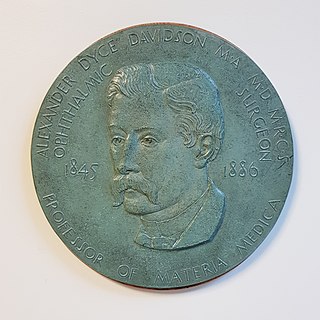Related Research Articles

William Cullen FRS FRSE FRCPE FPSG was a Scottish physician, chemist and agriculturalist, and professor at the Edinburgh Medical School. Cullen was a central figure in the Scottish Enlightenment: He was David Hume's physician, and was friends with Joseph Black, Henry Home, Adam Ferguson, John Millar, and Adam Smith, among others.

Sir Robert Christison, 1st Baronet, FRSE FRCSE FRCPE, was a Scottish toxicologist and physician who served as president of the Royal College of Physicians of Edinburgh and as president of the British Medical Association (1875). He was the first person to describe renal anaemia.

Sir William Whitla was an Irish physician and politician.

Professor Alfred Joseph Clark MC FRS FRSE was a British pharmacologist and Professor of Pharmacology at the University College, London. He was a de-bunker of fraudulent remedies and did many early studies on the placebo effect of many claimed cures.

Sir Andrew Douglas MaclaganPRSE FRCPE FRCSE FCS FRSSA was a Scottish surgeon, toxicologist and scholar of medical jurisprudence. He served as president of 5 learned societies: the Royal Medical Society (1832), the Royal College of Surgeons of Edinburgh (1859–61), the Royal College of Physicians of Edinburgh (1884–87), the Royal Society of Edinburgh (1890–5), and the Royal Scottish Society of Arts (1900).

Professor John Hope was a Scottish physician and botanist. Although he did enormous work on plant classification and plant physiology, due to an absence of publications, he is now best known as an early supporter of Carl Linnaeus's system of classification.

Sir Thomas Richard Fraser was a British physician and pharmacologist. Together with Alexander Crum Brown he discovered the relationship between physiological activity and chemical constitution of the body.

Sir Thomas Grainger Stewart was an eminent Scottish physician who served as president of the Royal College of Physicians of Edinburgh (1889–1891), president of the Medico-Chirurgical Society of Edinburgh, president of the medicine section of the British Medical Association, and Physician-in-Ordinary to the Queen for Scotland. He was perhaps best known for describing the condition known as multiple neuritis as well as directing scientific attention in Great Britain to the deep reflexes.
Andrew Duncan, the younger was a British physician and professor at the University of Edinburgh.

Francis Home FRSE FRCPE was a Scottish physician, and the first Professor of Materia Medica at the University of Edinburgh, known to make the first attempt to vaccinate against measles, in 1758. In 1783 he was one of the founders of the Royal Society of Edinburgh.
Robert Brockie Hunter, Baron Hunter of Newington LLD MBE DL FRSE was a physician and university administrator. He was the personal physician to Field Marshal Montgomery, during the Second World War in North west Europe from 1944 to 1945. To friends and colleagues he was known as Bob Hunter.
Sir David Campbell MC FRSE (1889–1978) was a Scottish physician and pharmacologist. He was Professor of Materia Medica at Aberdeen University from 1930 to 1959. He won the Military Cross in 1918 due to his bravery serving in the Royal Army Medical Corps.
Matthew Charteris FRSE LRCSE. He was British physician and academic who was the Regius Professor of Materia Medica at the University of Glasgow. He was also the author of the standard medical textbook the Practice of Medicine. He was an advocate of the influence of good climate upon health.
Dr William Craig FRSE FRCSE was a Scottish surgeon and botanist. He was an expert on jaborandi, an appetite suppressant. His collections and studies were largely focussed upon Perthshire in central Scotland.

Alexander Dyce Davidson MD FRSE was Scottish academic and surgeon. He was Professor of Materia Medica at Aberdeen University. He was described as a "sweet and amiable character". He specialised in ophthalmic surgery.
Dr Robert Edmund Scoresby-Jackson FRSE FRCPE FRCSE (1833–1867) was a short-lived but influential British physician and historian. He specialised in the effects of climate upon health.
John McQueen Johnston FRSE CBE FRCPE FRCSE LLD (1901–1987) was a Scottish physician and pharmacologist. He served as the Principal Medical Officer for the Department of Health in Scotland until 1968.

Ralph Stockman FRSE LLD was a Scottish professor of Materia Medica and Therapeutics at the University of Glasgow. He was an expert on iron deficiency anaemia.
Prof David Waters Sutherland CIE FRSE was an Australian physician who ran the King Edward Medical College in Lahore and married Princess Bamba Singh.
Dr Joseph Tillie FRSE was a 19th-century Scottish physician and pharmacologist with a special knowledge of "exotic poisons" such as curare.
References
- ↑ The Cambridge Medical School: A Biographical History, Sir Humphry Davy Rolleston
- ↑ Biographical Index of Former Fellows of the Royal Society of Edinburgh 1783–2002 (PDF). The Royal Society of Edinburgh. July 2006. ISBN 0-902-198-84-X. Archived from the original (PDF) on 4 March 2016. Retrieved 18 January 2018.